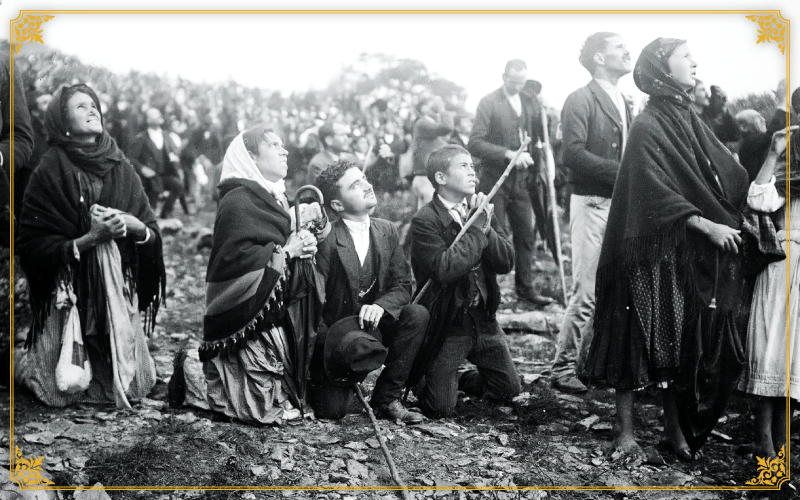The Latest Document from Pope Francis and Cardinal Fernández
On May 17, 2024, the Vatican’s Dicastery for the Doctrine of the Faith released its “Norms of the Dicastery for the Doctrine of the Faith for proceeding in the discernment of alleged supernatural phenomena” [hereafter, Norms of the Dicastery]. It is a highly problematic document with potentially devastating effects. Since The Fatima Center is dedicated to promoting the Message of Our Lady of Fatima, a document which drastically alters how Catholics understand the authenticity of supernatural apparitions concerns us directly.
For those who prefer not to read the entire document, we recommend perusing the Vatican’s own summary of this new document. (See the article titled “Vatican releases new norms on alleged supernatural phenomena” [hereafter, Vatican summary], on the Vatican News website.)
This article, split into several parts for readability, examines what I perceive as the three gravest problems with the new norms and the most probable fallout.
The First Grave Problem: Church Authority Will No Longer Declare Anything Supernatural
According to the Vatican’s summary of the official release of the new norms:
“[N]either the Diocesan Bishop, nor the Episcopal Conferences, nor the Dicastery will declare that these phenomena are of supernatural origin, even if a Nihil obstat is granted” (I, 23). [Norms of the Dicastery]
This change opens a proverbial Pandora’s Box. Its impact cannot be underestimated.
First, in typical modernist fashion, this move helps deny or at the very least blur the distinction between natural and supernatural. Second, it shirks the responsibility and authority entrusted by God to the magisterium as regards these matters.[i] Third, it reflects an attitude that supernatural phenomena are not that important. After all, if they were important, if God or Our Lady really were speaking to us, then it would be sufficiently important to warrant all the investigation necessary for a definitive judgment by Church authority.
It is clear that the authors of this new norm misunderstand how God uses private revelations, as well as the role of the elected seer and the magisterium. God has provided His Church with built-in “checks and balances” for discerning heavenly messages. The seer receives the message. However, the magisterium must then declare it authentic. Both seer and magisterium must cooperate with the grace which God provides. This helps prevent errors, abuses, and diabolic deceptions.
Yet now the Church authority is deciding a priori that it will not judge alleged supernatural phenomena (reminiscent of Francis’ bombshell airplane retort, “Who am I to judge?”). In effect, they are saying, “We refuse to cooperate with the graces which God entrusts to our office.” Perhaps this should not surprise us since this attitude is manifest in many of their actions. Nevertheless, the blatant “in your face” manner in which it is unabashedly proclaimed should raise eyebrows. It is no longer something they are even trying to hide.
If today’s Magisterium refuses to accept the role and duties entrusted to them by Christ (sadly, that is par for the course these days), then what of the sheep who are accustomed to following their shepherd’s example?
If today’s Magisterium refuses to judge any event as supernatural, then no one else will because no one else has the God-given authority to do so. Keep this point in mind, as we’ll return to it in the second part of this article.
Given this new norm, the most the Vatican is willing to assert is that an alleged supernatural phenomenon is “free of error” (nihil obstat). But when it comes to messages allegedly from Heaven, this means little to nothing. After all, you or I can write a book that Church authority declares “free from error.” But no one would be brazen enough to then claim the book is from Heaven, divinely inspired, or contains the solicitous words of Our Blessed Mother to Her children.
With this kind of minimalism, so typical of modernists, the new norms are effectively destroying the possibility of mankind receiving further revelations from God and knowing that they are from God. Again, we come full circle; the modernist refuses to acknowledge the objective, external, and verifiable supernatural acts that only God is capable of working. Like the blind leading the blind, they refuse to see the unmistakable signs of God in our midst.
Our Lady of Fatima, pray for us!
ENDNOTE:
[i] Catholic teaching has always held that only the proper magisterial authority can judge an event to be supernatural. Obviously, this can only be done with the assistance of an actual grace. Yet, the Holy Ghost grants such a grace to the papal office and the episcopal see where the event occurred. Since the modernist downplays, or denies, the effects of grace, then it makes sense for the modernist, trapped within his erroneous system, to refuse to accept any responsibility that can only be carried out with the assistance of grace.



